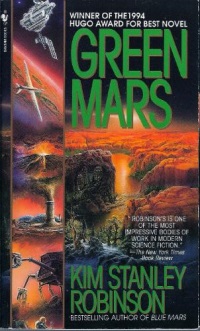
When I first read the second book of the Martian Trilogy, I was immediately struck by the epic sense of history it embodies. Set fifty years after the end of the first novel, it shows how the real Martians are the children of the settlers who have never known Earth. Standing over two meters tall, they move with a grace that those born on Earth can never achieve. Moreover, their profound disinterest of all things Terran and unselfconscious Martianness marked the passing of an era.
Rereading this, I find that my favourite part of the novel is once again the opening section which recounts the story of Nirgal and the other nisei growing up in Zygote. It’s not just seeing the First Hundred from the point of view of a true Martian, it’s also the developing relationships between the nisei which are in many ways reflections of the relationships between their elders. There is a delightful so close, yet so far feeling that permeates Nirgal’s perspective.
I also greatly enjoyed the introduction of the other major new character in this book: Art Randolph. Finally we get to see what Earth is like. Even more importantly, we get to read first-hand accounts of the metanat executives who seem to be the perpetual villains of the series. For this two reasons, I’m willing to forgive the fact that this new character looks suspiciously like a cross between Frank Chalmers and John Boone.
The rest of the novel however, I am less enamoured of. Part of it is because I find myself tiring of the POVs of characters like Maya Toitovna, Ann Clayborne and Nadia Cherneshevsky. They never really seem to change, despite all that has happened. Perhaps there is a truism in this, that people never fundamentally change. But the fact remains that they have nothing really new to say and their responses to events as they unfold are completely in-character for them and therefore predictable.
I did like how Maya is used to illustrate the memory loss problems among the very aged and how obsessed she becomes in trying to discover if Frank Chalmers really did kill John Boone. But it’s a plot point that goes nowhere. In the meantime, we don’t get the POV of people like Kasei who is such a driving force in this book or any of the senior metanat executives. It seems as if the author only wants to inhabit the minds of the characters for whom he personally feels sympathy.
Worse, I find myself increasingly sceptical of the plot’s plausibility. Why do the metanats keep bringing people to Mars when those people just keep joining the enemy’s side? The only reason must be that everyone on Earth hates the metanats. But then why do they continue to exist? Even the economic case for the metanats feels unreal. They’re not really interested in making money since they already have all the money. So what do they want?
I’m also struck by how the Martians are all apparently angels in utopia if it weren’t for the metanats. Sure, Jackie sleeps around to gain power and influence, the Reds feud with the Greens to the point of drawing blood and so forth. But those are, in modern parlance, rich-world problems. Is there no homelessness or unemployment? Lack of access to medical services? Competition for resources? How can individuals like Maya be psychotic but Martian society in the aggregate be so sane?
Finally, there seems to be some squeamishness when it comes to death and its consequences. Maya commits a single outright murder and that seems to be a big deal. But all of them are coordinating large numbers of what are effectively soldiers. Presumably they are killing significant numbers of metanat security officers and executives. Attacking Kasei Valles alone must have killed hundreds if not thousands. Yet all that death seems oddly bloodless. The POV characters never seem to spend any time thinking about it.
For these reasons, I find myself being a lot less impressed by Green Mars than the first book. I certainly feel disappointed that the political and economic aspects now seem so simplistically drawn to me. Make no mistake, the attention to detail, strong characters and all around good writing still makes this novel a very worthwhile read but I just can’t bring myself to call this a great book any longer.